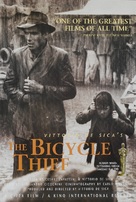Reviews provided by RottenTomatoes
Joshua Rothkopf, Time Out: It's a title you simply must watch, not necessarily for the truths it packs but rather for the bombed-out buildings of postwar Italy, peripheral details that director Vittorio De Sica insisted on. Read more
Kenneth Turan, Los Angeles Times: This film manages to appeal to the better angels of our nature in a way that only deepens as we grow older along with the film. Read more
Kevin Thomas, Los Angeles Times: Simplicity is at the heart of The Bicycle Thief, as it is with so many films that endure. Read more
Don Druker, Chicago Reader: Undeniably the most important neorealist film after Rossellini's Open City. Read more
Jonathan Rosenbaum, Chicago Reader: The work of screenwriter Cesare Zavattini, director Vittorio De Sica, the nonprofessional actors, and many others is so charged with a common purpose that there's no point in even trying to separate their achievements. Read more
Roger Ebert, Chicago Sun-Times: The Bicycle Thief is so well-entrenched as an official masterpiece that it is a little startling to visit it again after many years and realize that it is still alive and has strength and freshness. Read more
Bob Graham, San Francisco Chronicle: The Bicycle Thief is one of those wonderful titles whose power does not sink in until the film is over. Read more
Hank Sartin, Time Out: De Sica carefully balances a generally tragic sensibility with a quiet undercurrent of hope, all the while sucking us into the story with the sheer urgency of the search for a stolen bicycle. Read more
David Jenkins, Time Out: De Sica's neo-realist lodestone may have retained its vitality over the decades, but whatever sense of anger it whipped up in the disgruntled masses of postwar Rome feels lost to the excessively syrupy score. Read more
J. Hoberman, Village Voice: Scarcely a story found in the street, The Bicycle Thief is an allegory at once timeless and topical. Read more

